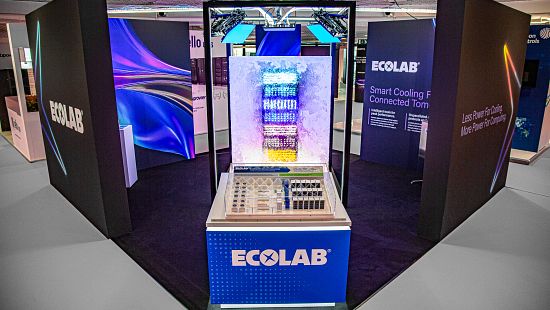Cooling for data centres is a hot topic at Datacloud Global Congress 2025

Mike Obradovitch, Area Vice President of Corporate Accounts for Ecolab’s Global High Tech division, shares how Ecolab is helping data centres transform thermal management into a competitive edge.
The energy was electric, and the vibes were chill at Datacloud Global Congress 2025 in Cannes, France. Cooling in the era of high-performance computing (HPC) was a significant focus, and our conversations made it clear that data centres are rethinking the role energy and water management will play. To meet the soaring demand of AI, machine learning and other high-density compute applications and workloads will require more power and generate more heat. In turn, data centres are responding with more targeted solutions like direct-to-chip liquid cooling, which delivers precision cooling directly to the heat source. This approach improves efficiency, supports reliable performance and protection of HPC infrastructure and eases the burden on facility-wide cooling systems.
Cooling emerged as a critical topic in discussions at our booth during the event. Data centre operators want to know how they can best adapt to manage the increased heat of high-density computing racks and advanced processors. In addition to fiscal and sustainability concerns, uncontrolled temperature excursions in data centres can also shorten hardware life and disrupt services for their customers.
These conversations were testament to a trend among data centres that cooling will no longer be a “background utility.” Instead, the evolution of cooling operations is moving to the forefront, helping data centres build versatility and flexibility into cooling architecture designs and enhance operational resiliency, while furthering sustainability initiatives. When executed effectively, well designed cooling architectures require less power, freeing more energy that can be allocated to HPC, enabling increased rack density and better support for next-generation processors.
“To solve these complex issues, the industry must come together, collaboratively, to move further, faster.”
Ecolab has invested heavily in building an innovative, long-standing portfolio of advanced cooling technologies for data centres. At Datacloud, we highlighted 3D TRASAR™ Technology for Direct-to-Chip Liquid Cooling, one of our most recent innovations. Designed specifically for data centres, the solution delivers real-time monitoring of coolant health, tracking coolant–specifically glycol–concentration, temperature, pH, flow rates and other fluid health indicators. The solution helps identify early indications of fluid degradation or dilution, allowing for proactive remediation activities to protect HPC servers and critical cooling infrastructure at both the facility and technology levels. When coupled with experts in the field providing consultative guidance, facilitating lab diagnostics and supporting customers with hyper-care commissioning models, data centre operators receive an integrated solution that optimizes performance, efficiency and sustainability across the liquid cooling deployment.
This is when the potential of Ecolab’s advanced cooling management portfolio can be fully realized. When digital tools like Water Quality IQ™, 3D TRASAR Technology for Cooling Water, 3D TRASAR Technology for Adiabatic Cooling and Water Track IQ™ are leveraged, data, context and actionable insights for data centres are delivered real time. Together, these technologies create a full site-to-chip cooling strategy that gives data centre operators visibility, control and performance at every level.
The event strengthened my perception that data centre leaders are looking for more than products alone — they need the expertise of long-term collaborators who understand the complexity of their operations and can help them adapt to rapidly changing demands with confidence. They also need quality, efficient solutions at scale, so that when their workloads evolve, their cooling infrastructure can too. Ecolab’s advanced cooling management portfolio delivers on that need.
In addition to our booth presence, I had the opportunity to participate in the iMasons Advisory Council meeting, which Ecolab proudly sponsored. iMasons is a thought-leadership group uniting leaders across the data centre industry to address five critical challenges:
- People (workforce shortage)
- Planet (sustainability)
- Power (access to energy)
- Perception (public understanding)
- Protection (data security)
To solve these complex issues, the industry must come together, collaboratively, to move further, faster. During the meeting, we highlighted our recent white paper with Digital Realty to demonstrate the value of strategic partnerships and how specialized expertise can lead to impactful solutions. One of the key insights we shared was the potential for data centre cooling designs that use water on-site, particularly renewable and non-potable sources, to reduce energy use and lessen the burden on local watersheds. When power consumption of data centres is conserved through efficient and effective water use, it can be returned to the grid or redirected to support additional computing capacity at the data centre. These efficiencies, when scaled across the industry, can help reduce the need for building new data centres, protecting vital resources for our customers and the surrounding community.
Coming out of Datacloud Global Congress 2025, I was encouraged by the excitement from the discussions and inspired by the unified mission the industry shared. We are proud to support this progress and remain committed to helping the industry harness the full potential of cooling.



